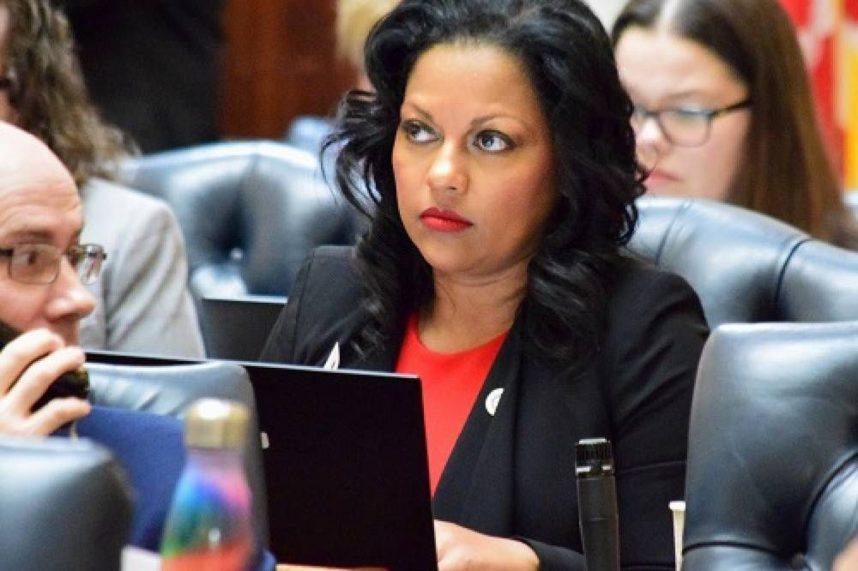Maryland iGaming Bill Set for House Vote, Senate Leaders Maintain Opposition
Posted on: March 14, 2024, 10:03h.
Last updated on: March 14, 2024, 11:04h.
Maryland iGaming legislation passed the House Ways and Means Committee by a 15-7 vote on Wednesday.

The online casino gaming statute now moves to the full House floor. That’s where it will need to be voted on and passed to the Senate before the state General Assembly’s “Crossover” day on Monday, March 18. The state’s 2024 legislative session is to run through April 8.
House Bill 1319 comes from Del. Vanessa Atterbeary (D-Howard), who chairs the Ways and Means Committee. The measure seeks to allow the state’s six brick-and-mortar casinos to each run up to three iGaming platforms.
Maryland’s four off-track betting parlors and two bingo facilities currently possess sports betting licenses, and would qualify for an online casino skin. Publicly traded media conglomerate Urban One, which owned a stake in MGM National Harbor before selling it to pursue a casino development in Richmond, would also receive an iGaming opportunity. Another five online casino licenses would be put up for a competitive bid.
Voters have the final say on gaming expansion matters. If HB 1319 passes the General Assembly and is signed by Gov. Wes Moore (D), a statewide ballot referendum would ask voters to amend the Maryland Constitution to permit online casino gambling.
Social Equity Provisions
Atterbeary’s bill includes many elements to promote inclusion and deliver social equity.
The casinos would be required to share a minimum of 5% of their online win with a “social equity applicant partner.” To obtain privileges for two additional iGaming skins, casinos must agree to share at least a third of the online gaming income with their social equity applicant partner.
The qualifying terms for a social equity applicant partner would be defined by the Governor’s Office of Small, Minority, and Women Business Affairs. The legislation as written mandates that those individuals not have a net worth above a to-be-determined amount set by the office.
Each iGaming license would cost $1 million, and gross revenue would be subject to a to-be-determined tax. The state’s financial windfall from authorizing iGaming would go to the Maryland Blueprint, an early childhood, elementary and secondary education program.
Senate No-Go
Senate leaders say Atterbeary and other House lawmakers supportive of the iGaming bill are wasting their time.
Senate President Bill Ferguson (D-Baltimore City) has repeatedly said that gaming expansion measures won’t be considered in his chamber this year. State Sen. Guy Guzzone (D-Howard) agrees that 2024 isn’t the year to consider widening the state’s gaming industry.
Guzzone’s opposition is important because he chairs the Senate Budget and Taxation Committee, where Sen. Ron Watson’s (D-Prince George) Senate Bill 603 landed in January. Watson’s iGaming measure has since sat unconsidered in the committee.
Watson’s bill sought to allow the six casinos to each manage up to two iGaming platforms. Licenses would also cost $1 million and gross revenue would be taxed at 47%.
If Atterbeary’s iGaming bill is voted on and passed by the House, the legislation would presumably be allocated to Guzzone’s Budget and Taxation Committee. She hopes with the tax benefit numbers presented that Guzzone might change his stance.
I think it’s a different story when things are in front of you and actually on the table and are passed,” Atterbeary told Maryland Matters. “We made it very clear that our members are interested in doing something for the Blueprint. We’re going to send over what we think is the right thing to do.”
iGaming is legal in seven states, including Connecticut, Delaware, Michigan, New Jersey, Pennsylvania, Rhode Island, and West Virginia.
Related News Articles
Maryland iGaming Opposed By Most State Residents: Poll
New York iGaming Bill Reintroduced by Democratic State Sen. Joe Addabbo
Maryland iGaming Bill Gets Hearing as Brick-and-Mortar Play Wanes
Most Popular
FTC: Casino Resort Fees Must Be Included in Upfront Hotel Rates
Genovese Capo Sentenced for Illegal Gambling on Long Island
NBA Referees Expose Sports Betting Abuse Following Steve Kerr Meltdown
UPDATE: Former Resorts World & MGM Grand Prez Loses Gaming License
Most Commented
-
UPDATE: Whiskey Pete’s Casino Near Las Vegas Closes
— December 20, 2024 — 30 Comments -
Caesars Virginia in Danville Now Accepting Hotel Room Reservations
— November 27, 2024 — 9 Comments -
UPDATE: Former Resorts World & MGM Grand Prez Loses Gaming License
— December 19, 2024 — 8 Comments -
FTC: Casino Resort Fees Must Be Included in Upfront Hotel Rates
— December 17, 2024 — 7 Comments
















Last Comment ( 1 )
As a former resident of Ellicott City, Maryland I assure you that iGaming will bring more gambling chaos than Marylanders can realize or anticipate. So, what does a gambling addiction look like? How is that officially described? It's not a vague definition that varies from person to person depending on their own individual circumstances. The DSM-5's (Google it) official criteria for diagnosis are exhibiting FOUR of the following NINE criteria during the past 12-month period: -- Need to gamble with increasing amounts to achieve the desired excitement. -- Restless or irritable when trying to cut down or stop gambling. -- Repeated unsuccessful efforts to control, cut back on or stop gambling. -- Frequent thoughts about gambling (such as reliving past gambling or planning future gambling). -- Often gambling when feeling distressed. -- After losing money gambling, often returning to get even. ("chasing" one's losses.) -- Lying to hide gambling activity. -- Risking or losing a close relationship, a job, or a school or job opportunity because of gambling. -- Relying on others to help with money problems caused by gambling. That's it. No need to guess about the official criteria anymore. No need to wonder about what to look for. Friends and family members now know exactly what to look for. Say No to iGaming. Don't choose to bring more gambling chaos to Maryland!